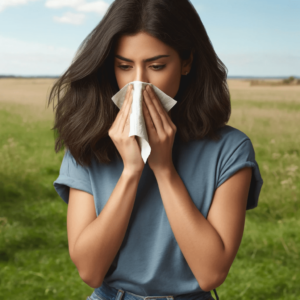May 07, 2024 | Black & Kletz Allergy

In the Washington, DC metro area, tree pollens are released in the early Spring and may persist until early-June. In fact, the beginning of the tree season has come earlier and earlier over the last decade. Tree pollen is often detected in mid-February and occasionally has been seen as early as January in the Washington, DC regional area. Grass pollen usually begins to be seen in May and typically can be found throughout the Summer lasting until August. In addition, molds are seen throughout the Summer, particularly in the Washington, DC area which was built on a swamp. The humid weather is an aggravating factor for allergies and a “friend” of mold growth. Also keep in mind that normal indoor allergens such as dust mites, pet dander, and cockroaches are still present in the Summer and thus still play a major role in affecting allergic individuals in the Spring, as well as the rest of the year.
The allergies that individuals have in the Summer are referred to as allergic rhinitis (i.e., hay fever) and/or allergic conjunctivitis (i.e., eye allergies). These allergy symptoms may include sneezing, runny nose, itchy nose, nasal congestion, post-nasal drip, itchy throat, sinus congestion, sinus headaches, fatigue, snoring, itchy eyes, watery eyes, puffy eyes, and/or redness of the eyes. Hay fever is an interesting name because individuals with hay fever do not get a fever and they are not necessarily allergic to hay. It was initially called hay fever because hay is typically harvested in the Fall and many people had allergy symptoms in the Fall. It just so happens that ragweed pollinates at the same time that hay is harvested in the Fall, so the words hay fever actually refer to ragweed allergies in the Fall. Likewise, the words rose fever refers to tree pollen allergies. Similarly to the term hay fever, patients with rose fever had no fevers and they were not allergic to roses. It just so happens that roses bloom in the Spring when trees and grasses pollinate. Thus, rose fever refers to the Spring allergies caused by the release of tree and grass pollen.
Asthmatic individuals may experience chest tightness, wheezing, coughing, and/or shortness of breath in the Summer. In addition to the increased humidity found in the Washington, DC metropolitan area, more exercise, excessive heat, and increased air pollution (i.e., smog) are factors that occur more often in the Summer than that of other seasons. These factors may trigger or exacerbate asthma in certain sensitive individuals.
The diagnosis and treatment of Summer allergies and/or asthma begins with a comprehensive history and physical examination. Allergy skin testing or allergy blood testing is frequently done in order to identify the aeroallergen responsible for causing the annoying allergy symptoms. Medications are usually prescribed which may include oral antihistamines, nasal corticosteroids, oral decongestants, leukotriene antagonists, nasal antihistamines, nasal anticholinergic agents, eye drops, inhaled corticosteroids, and inhaled beta-agonists. In cases of perennial, multi-seasonal, and/or severe symptoms, allergy injections (i.e. allergy shots, allergy immunotherapy, allergy desensitization, allergy hyposensitization) to the responsible allergens usually provide long-term benefits and reduces the need for allergy or asthma medications. Allergy shots are effective in 80-85% of patients and are generally taken for 3-5 years.
In addition to environmental allergies (i.e., pollens, molds, dust mites, pets), venomous stinging insect reactions are more common in the Summer than that of other months. Honey bees, yellow jackets, wasps, yellow-faced hornets, and white-faced hornets are the stinging insects native to the Washington, DC metro area. In other warmer and more southern areas of the U.S., the fire ant is a stinging insect that may also cause serious anaphylactic reactions. Anaphylactic reactions to individuals with insect sting allergies may be life-threatening and it is important to see an allergist if one has a reaction to a venomous flying insect sting. The board certified allergist, like the ones at Black & Kletz Allergy will evaluate the stinging victim with allergy testing to the stinging insects and then recommend a course of treatment. This treatment may range from a prescription for a self-injectable epinephrine device (i.e., EpiPen, Auvi-Q, Adrenaclick) to a prolonged course of allergy shots with insect sting venoms (i.e., venom immunotherapy) depending on the patient’s reaction history.
The board certified allergy specialists at Black and Kletz Allergy have been diagnosing and treating allergies, asthma, and insect sting allergies for more than 5 decades in the Washington, DC, Northern Virginia, and Maryland metropolitan area. We see both adults and pediatric patients. We have offices in Washington, DC, McLean, VA (Tysons Corner, VA), and Manassas, VA. We have on-site parking at each of our 3 locations. Our Washington, DC and McLean, VA offices are Metro accessible. Black & Kletz Allergy offers a free shuttle service between our McLean, VA office and the Spring Hill metro station on the silver line. If you suffer from allergies, asthma, and/or insect sting allergies, please call one of our offices to schedule an appointment. You may also click Request an Appointment and we will respond within 24 hours by the next business day. Black & Kletz Allergy is dedicated in providing the most advanced allergy treatment modalities in a amiable, considerate, and professional environment.












